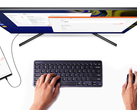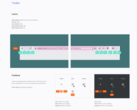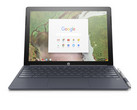Chromebooks have always been a niche product. The browser-based Chrome OS is limiting compared to its competitors (unless you’re willing to tweak it), but an update planned for release later this year may transform Chromebooks into the best Android development machines on the market.
Google announced that Chrome OS would be able to support Linux apps at their I/O 2018 event yesterday. The feature is currently only available on Google’s own Pixelbook, and even then only on the Dev channel. However, it’s a promising piece of work that should greatly enhance the usability of Chromebooks, which have struggled for years to find a meaningful place outside of education markets.
Linux support addresses one of the chief complaints critics of Chromebooks have lodged - development. If you wanted to develop apps or software for Chrome OS, you ironically couldn’t code on Chrome OS itself. Rather, you would have to write code on a machine running an IDE on Windows, MacOS, or Linux and then port the code over to a Chromebook for testing. Any further software development would require constantly switching back and forth between machines.
Google is finally listening to these complaints by enabling Linux apps, specifically IDEs, to run on Chromebooks for native testing, and the search engine giant is implementing the feature in a clever way. Chromebooks have long been able to run full Linux, albeit with a lot of tweaking inside a Crouton shell, which reduces some of Chrome OS’s inherent security features. Google’s official implementation of Linux uses a similar technique but retains Chrome OS’s built-in security in the process.
Essentially, the Linux apps will run in a VM built specifically for Chrome OS. The VM, which is based on Debian’s Wayland client manager. Kan Liu, product management director for Chrome OS, said that supported Linux software will run “within a security sandbox, running inside a virtual machine.” The VM is tooled to make the process as seamless as possible; to the end user, the Linux apps can be opened from the Launcher and will look just like standard windows indiscernible from other Chrome OS apps.
This could be a boon for Android and Chrome developers. Running coding tools like VIM and IDEs natively on a Chromebook would eliminate the back and forth Chrome OS developers have had to manage for years. The OS’s growing support for Android apps could also make this feature enticing for Android devs. After all, Chromebooks are still some of the least expensive devices on the market. If you need a “scratch” machine for travel or transit, Chromebooks could be a good option for developers on the go.
There is a caveat; since Chrome OS is based on Debian (“Stretch,” to be specific), on Debian-compatible software will be supported. That shouldn’t be a problem for most Linux users, as Debian and its variants (e.g., Ubuntu) are among the most popular distros. Linux support should start rolling out to other Chromebooks later this year.




















